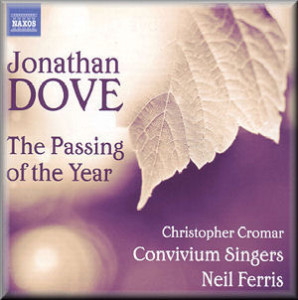There’s a moment in the James Bond film Goldfinger when M asks Bond, “What do you know about gold?” and Bond answers simply “I know it when I see it.” This came only a few months after Supreme Court justice Potter Stewart famously used a similar phrase to describe his threshold test for pornography. I thought of this as I was about to describe the music on this program of choral works by English composer Jonathan Dove with the term “accessible”: what makes a piece of music “accessible” may be impossible to define in a universal way, but “I know it when I hear it.” And this music is not only refreshingly new, and modern, but also absolutely accessible (you’ll know when you hear it). Its solid foundation in the tonal and melodic as opposed to the atonal and tuneless world certainly has a lot to do with it; but there’s much more happening here.
It doesn’t take long to appreciate Dove’s way with a text, and his facility with vocal writing. Tackling a text such as Who killed Cock Robin? and successfully casting it musically takes some real finesse, and Dove not only vividly depicts the story but creates a superb piece of “choral theatre” that will keep you riveted until the final “bell toll”. The opening song cycle, The Passing of the Year, for double chorus and piano, dedicated to the memory of the composer’s mother, is remarkable both for the variety of musical ideas (always absolutely “right” as double-choir conceptions), and for the musical coherence from beginning to end of the set of seven thematically related poems (authored by Blake, Dickinson, Tennyson, and a couple of others).
As seems typical of Dove’s work in general, there’s a strong appreciation for melody, but the melodic themes are carefully and intelligently woven into the textural fabric, which is always richly colored with all possible variants available from the tonal palette. Dissonances and tonally ambiguous passages are integral, never gratuitous nor inserted merely for “difficulty’s” sake, as is the case with much modern choral music. Dissonance is effectively employed, along with exciting rhythmic figuration in pieces such as It sounded as if the streets were running and the pleasingly Britten-esque How happy is the little Stone (both part of a set of three songs to Emily Dickinson poems).
The confluence of imaginative harmonic ideas and engaging melody is artfully displayed in the opening minute of Wellcome, all Wonders in one sight!; but the delight in a melodic idea can become a bit excessive, as in the endlessly repeated six-note theme of In Beauty May I Walk. There’s an occasional stylistic reminder of an Arvo Pärt (The Passing of the Year’s “Adieu! farewell earth’s bliss”) or Eric Whitacre (I am the day, which cleverly works in references to the Advent chant “O come, O come Emmanuel”), but Jonathan Dove is unquestionably a composer with his own view of the choral music world and, especially in relation to Whitacre, his music possesses a more profound stylistic integrity that’s essential to enduring legitimacy and longevity.
Interestingly, one of the program’s highlights is not a choral piece at all, but a work for solo mezzo-soprano, My love is mine (text from the Song of Songs). Felicity Turner, a member of the Convivium Singers, will astonish you with the clarity, agility, and expressiveness with which she sings this difficult four-minute piece, a marvel of pure, unaffected technique and absolutely spot-on intonation. Dove is fortunate to have the advocacy of such a first-rate ensemble as the Convivium Singers and director Neil Ferris, and we are equally lucky to have the benefit of this excellent recording that captures the choir in the realistic setting of a London church. Highly recommended.
































